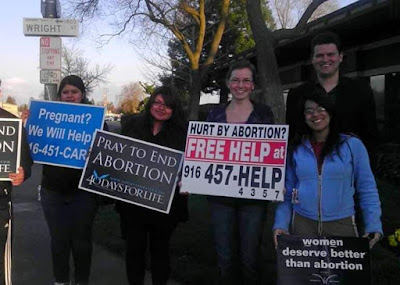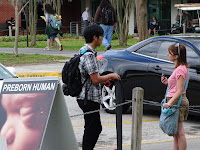Interview with a secular sidewalk counselor
Before we begin, Nick asked that I clarify that while he sidewalk counsels when he has the chance, he doesn’t counsel on a consistent basis the way some do. He didn’t want to give the false impression that he has devoted the same time and energy as some of his trainers and friends have, although he has enjoyed the experience and will continue to counsel when he has the opportunities.
 |
| (Nick in the upper right.) |
How did you get started sidewalk counseling? What draws you to the sidewalk compared to other types of pro-life work?
My campus pro-life club (through Students for Life of America) went to the sidewalk once or twice a week. In my area of northern California, Students for Life and 40 Days for Life formed a natural partnership such that about a half dozen people would counsel regularly.
So through the pro-life club I started sidewalk counseling in Sacramento in 2011. After I left the sidewalk during one of my very first visits, the other counselors saved three babies in a single day! So that was a fortunate and very encouraging beginning.
Sidewalk counseling is a great way to help women at the one-on-one level. Often pro-lifers are discouraged by a seeming lack of political progress, but the individual victories at the sidewalk can be encouraging. You really see how you can make a difference. Also sidewalk counseling helps you get to know the flesh and blood members of the pro-life movement, which serves as a powerful contrast to the stereotypes the media portrays.
What does your work entail? Describe an average day of sidewalk counseling.
I try to create a peaceful presence and provide women materials and references to local pregnancy resource centers (PRCs) (usually located in close proximity to the clinic). Not all pro-lifers at the sidewalk necessarily talk to the women; conversations are usually reserved for more experienced (and usually female) counselors. The rest of us keep a general presence, often holding signs with information, being eyes and ears in case there are any altercations, getting water or snacks for the group, and sometimes providing more security than one or two female counselors might have alone. Many of the counselors who aren’t interacting directly with the women approaching the clinic take the time to pray instead, though of course that’s not something I do personally.
Typically at least some of the women accept our information. Nearly always some passersby will hurl profanity or flip the bird. It’s common to hear street preachers mix evangelization with sidewalk counseling. It’s also common for clinic escorts to play loud music or put up barriers like tarps in order to block the women’s view of the counselors.
What are the most difficult aspects of this work, and how do you handle those?
By far the hardest part is being a man. Successful male counselors are unicorns. Pregnancy is an intimate, personal, and deeply feminine experience. Often women associate their situation with their sex lives and this association make establishing trust and comfort with a man more difficult. Women going to the clinic often seem to feel more comfortable talking with other women, so if possible, I defer to the female counselor present.
However there are some circumstances in which it’s helpful to have a male counselor. For some women, interacting with a man who cares about what they’re going through can be a refreshing experience. And for some, having male counselors there makes them feel safe from an abusive situation. Additionally, men sometimes accompany the women in their lives to abortion appointments and end up waiting outside. Some of them find it helpful to talk to male counselors about the experience.
Do you hand out literature? If so, what is it about?
Yes, usually basic information about abortion and marketing materials for local PRCs. If you’re going to sidewalk counsel, I would recommend you read through these materials before you start handing them to people. Make sure you understand and agree with what you’re telling others. Some publications are particularly religious, or anti-sex or anti-contraception. Not all pro-lifers agree with those views. Usually, though, the reading material is straightforward, honest, harmless, and very helpful.
Do you refer people to local services? If so, what types or services? Provided by whom?
Yes, I usually refer to local PRCs, primarily for pregnancy tests, ultrasounds, and counseling. I try to send them to the closest PRC with the highest level of medical services. It’s also common for counselors to refer to maternity homes.
It’s my impression most sidewalk counselors are fairly devoutly religious, but you’re an agnostic. How does being a secular person intersect with sidewalk counseling? Does it hinder you in any ways? Help you in others?
I think being secular can be very helpful when you’re speaking to women, because you’re presenting life-affirming resources that are religiously neutral and unlikely to come off as anti-contraception or anti-sex. I think female secular sidewalk counselors have the greatest potential of any demographic to connect with women at the clinic.
But being non-religious can be negative in two ways: (1) People tend to assume all of us at the sidewalk are from the same group or all together, which means if someone evangelizes at the sidewalk I’m held liable for everything they say, despite agreeing with probably very little of it. (2) If and when religious sidewalk counselors find out I’m agnostic, some feel the need to evangelize to me. They often believe that without faith in God, a person cannot believe in or access objective morality, and so they find a secular pro-life worldview nonsensical, and they want to debate it.
While I don’t especially want to be evangelized to, I do admire the honesty. Sometimes Christian pro-lifers will be happy to have a secular person around to show that this is not a purely religious issue, but then the same people will argue that secular morality is impossible. I’m glad to get along well with religious allies, but if they really do think my worldview is foolish, I’d rather they be honest about it than placate or tokenize me.
Overall I think the fact that I’m at the sidewalk is encouraging to some but also causes cognitive dissonance for others.
How do you respond to people who say they are at the clinic for reasons other than abortion?
I say three things:
- I’m sorry if they felt we were making an assumption about why they were there. We’re just trying to provide options to women in difficult situations.
- If they are there for contraception services, I recommend they get their contraception from providers that do not offer abortion, such as Federally Qualified Health Centers (FQHCs). Some counselors keep lists of local FHQCs. There are actually 25 FHQCs in the San Francisco area alone.
- I let them know that life-affirming clinics like PRCs often offer health care services like STD tests and pregnancy tests.
What are some of the most common circumstances women describe that brought them to the clinic?
- Economic concerns
- Tumultuous and dysfunctional relationships
- Educational concerns (primarily among younger women)
Do you have ongoing relationships with any of the women you have met at the sidewalk? If so, what are those like?
No, but I know this is very common. Often women who choose life will be in touch with PRCs for several years to come.
Do you interact with clinic staff? If so, what has that been like?
Yes. It has been almost universally negative. Everything from them playing loud music and erecting large barriers, calling the cops unjustifiably, threatening with non-existent buffer zone laws, taking my picture without my consent, etc.
Many people believe that sidewalk counselors primarily try to shame and intimidate women. How do you respond to that idea?
I find this to be patently absurd. I have only seen pro-life women being harassed, yelled at, cursed at on the sidewalk. While it is true that are clips of people doing this sort of thing in 1980s and 1990s, this behavior has almost entirely fallen away. The most common sight at the sidewalk is harmless middle-aged Catholic women.
What do you think of buffer zone laws? Has your work been impacted by such laws?
Buffer zone laws are blatantly unconstitutional. If they were consistently applied for all political topics, they would severely restrict all forms of speech and activism. As such, even a lot of passionately pro-choice people should oppose buffer zone laws.
Pro-Life San Francisco actually maintains access to legal assistance in case there’s a problem, but I find that if they try to cite us and we threaten action, they usually back down because the law is already on our side.
What advice would you give someone interested in sidewalk counseling?
You shouldn’t feel guilty if you decide not to do it. There are many ways you can help women in need. If you are going to counsel and you’re a man, I would suggest making sure a female counselor is also there. But overall I think it is a great way to see the movement in action and help women in your community.
What advice do you have for people who don’t sidewalk counsel but still want to help women with crisis pregnancies?
Be a brand ambassador for your local PRC. Distribute their contact info everywhere: community poster boards, campuses, restrooms, gas stations, anywhere and everywhere helps. Attend annual fundraising dinners at local PRCs and donate. Help your local campus student group; they are often the best contact for the 18-24 age group where nearly 40% of abortions occur.
What do you believe the pro-life movement is getting right? What do you believe could be better?
The pro-life movement is doing an excellent job of providing a peaceful, compassionate, consistent, and nearly ubiquitous presence at abortion clinics throughout the country. However, too often well-meaning counselors mix their evangelization with their sidewalk work. The simple fact is that many secular women are on the fence about getting an abortion but not on the fence about premarital sex, contraception, and cohabitation. The stakes are too high for a potentially off-putting overtly religious approach, at least at the outset. Choosing life is a life-altering decision, and we are most effective when we focus on that specific issue and take care not to spend energy on other issues that may be major differences between the women and the counselors they’re speaking to.
- How Gabriela became a sidewalk counselor outside the clinic where she had her abortion, 3/16/2020
- In-depth interview with a millennial sidewalk counselor, 1/31/2018
- So I met some sidewalk counselors [interview of a sidewalk counseling veteran], 2/14/2014
- Sidewalk Counseling Masterclass from Equal Rights Institute
- Free training materials from Rehumanize International
- A training program from Sidewalk Advocates for Life
(Check out the list of ways you can support sidewalk counselors from HowToBeProlife.com.)


Leave a Reply
Want to join the discussion?Feel free to contribute!